Controversial call to hike petrol prices to secure Australia’s fuel security
Australians are being told to pay more at the pump or risk running out of fuel, a new report warns. The alternative could be “pandemonium”.
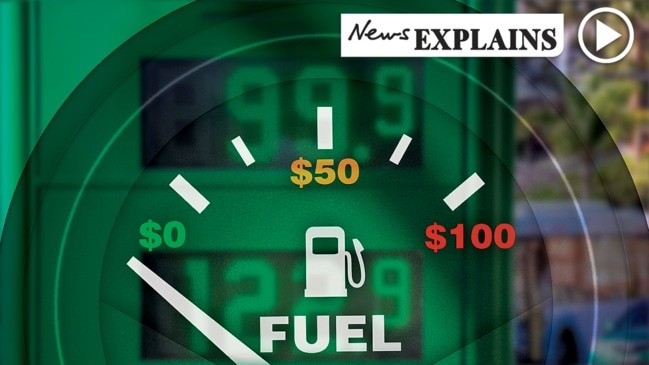
On the road
Don't miss out on the headlines from On the road. Followed categories will be added to My News.
There are calls for a hike in the pump price of petrol to combat a potential oil crisis in Australia which could lead to “pandemonium on the streets”.
A new report has said the Government will need to spend billions of dollars to shore up Australia’s fuel security – and the consumer should help pay for it through a new bowser tax.
“A genuine fuel supply crisis would make COVID-19 look like a blip,” said Australian Workers Union (AWU) national secretary Daniel Walton.
“Everyone of us should be worried about how precarious our fuel supplies are.”
But the NRMA said drivers already paid both fuel excise and GST on petrol and profit margins were steep.
“No one is holding back extracting money form motorists at the bowser and they don’t need any further encouragement,” the motorists’ organisation said.
Energy Minister Angus Taylor has not responded to the AWU report, but today the Government said it will invest $200 million in ramping up Australia’s oil storage. However, that figure is below the amount recommended in the report.
RELATED: Australia’s lack of fuel our national security ‘Achilles’ heel’
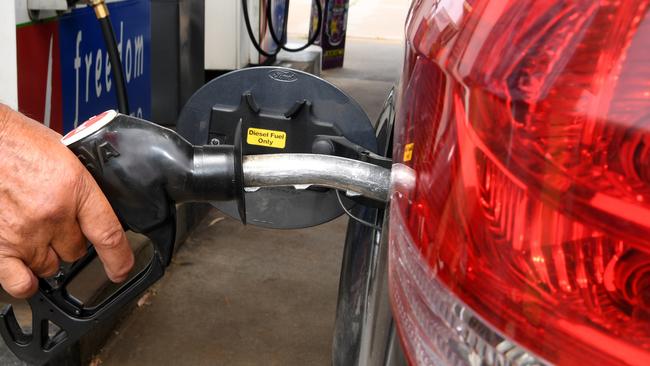
Questions about the amount of fuel Australia produces, refines and stores have been raised due to disruptions caused by the COVID-19 pandemic.
The issue once again came to the fore last week when Viva Energy, which produces Shell-branded fuel, said it might close its refinery in Geelong due to reduced demand caused by the Victorian lockdown and a slump in air travel. The refinery employs 700 people.
The closure of Geelong would leave Australia with just three refineries – one each in Victoria, Queensland and Western Australia. A decade ago, Australia had seven refineries including two in Sydney which have now closed.
The Government’s own modelling has said if all four refineries closed petrol would cost at least 1 cent a litre more.
Australia now imports around 90 per cent of its fuel needs, chiefly from Singapore, South Korea and Japan with much of that already refined.
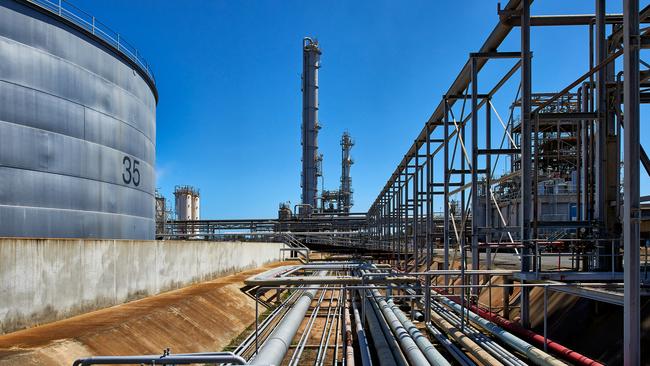
AUSTRALIA’S FRAGILE FUEL SECURITY
A report by BIS Oxford Economics for the AWU noted that Australia has only around 50 days of oil stocks. However the Government has said that figure is now as high as 84 days if you include stocks that are currently on their way to Australia.
Either figure is still below the minimum 90 days of fuel reserves demanded by the International Energy Association (IEA) of which Australia is a member. Australia has failed to meet the minimum requirement for many years.
At normal consumption levels, Australia now has 25 days of petrol and just 20 days of diesel stored up.
There are fears that in a crisis, if shipping lanes were closed or overseas refineries put out of action, Australia’s fuel supply could seize up.
The report calls on the Government to safeguard the future of the four remaining refineries, underwrite the cost of new storage capacity to 4000 million litres to meet IEA requirements and invest in more domestic oil production.
With other initiatives this could cost some $3.7 billion which would be passed onto the consumer through a 1.12 cents per litre pump tax adding 56 cents to the price of filling a 50-litre car.
“A global crisis disrupting our shipping routes is easily foreseeable. If this happened now Australia would run out of oil in just over three weeks,” said the AWU’s Mr Walton.
“Our trucks would run dry and food supply chains would come crashing to a halt. It wouldn’t just be toilet rolls running out in supermarkets and we would see pandemonium on the streets.”
RELATED: US oil giant fights Aussie fuel retailer over Caltex brand
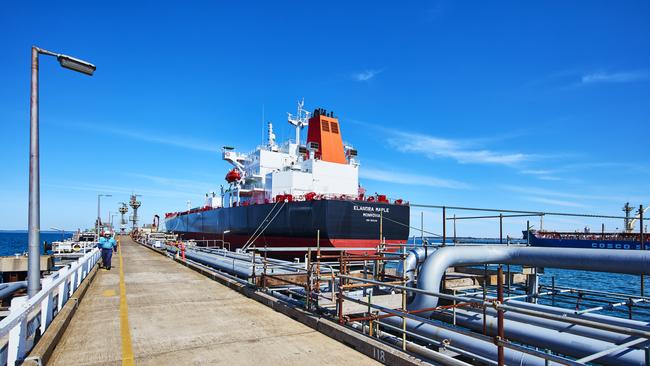
‘A SMALL PRICE TO PAY’
Mr Walton said the Government needed to guarantee the Geelong refinery’s future and the research’s conclusion were “pragmatic”.
“Australians are understandably sensitive about the thought of paying more at the pump but we actually have some of the cheapest petrol on the planet. A 1.12 cent a litre rise is a small price to pay to ensure we have enough fuel to last more than three weeks.”
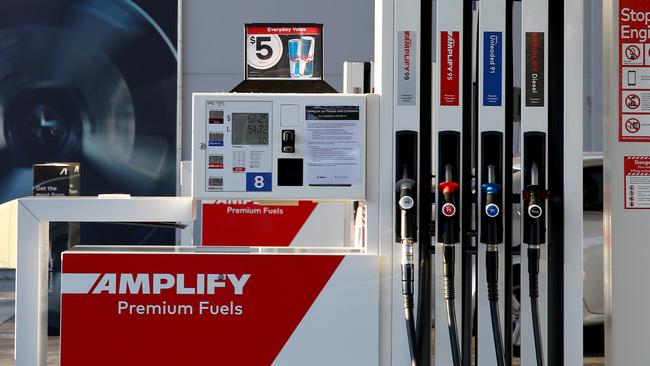
NRMA spokesman Peter Khoury told news.com.au that petrol retailers were recording some of their highest ever profit margins and fuel excise already set drivers back 42 cents a litre.
“Fuel security is important but motorists are already paying more than enough.
“At no point in history, including during the Second World War, has Australia not been able to access shipping lanes. It’s an issue, but the solution should not be another tax on motorists.”
Mr Khoury said diesel supply was the most critical concern with some of the lowest stocks, yet it was vital for military, logistics, emergency services and electricity generation.
GOVERNMENT’S PLAN
On Monday, the Energy Minister announced a $200 million initiative to build an additional 780 megalitres of onshore diesel storage with industry. The aim will be to increase diesel stocks to 28 days’ supply which the Government believes could add 10 extra days to its IEA obligations. He said the pan would safeguard 950 jobs.
“Almost all Australians are reliant on fuel and it is the lifeblood of so many sectors in our economy,” Mr Taylor said.
“That’s why it is critical that Australia has control over its fuel security arrangements and the Government is making sure of that.”
The Government will also look to “secure a baseline level of key transport fuels to be kept onshore to act as buffer against supply shocks”. While that should help Australia meet the IEA’s 90-day rule, there is no commitment that the new investment will guarantee this.
Motorists could end up paying for the new initiative. The Government said it hoped there would be “minimal price impacts” and it would cost more if all refineries closed.
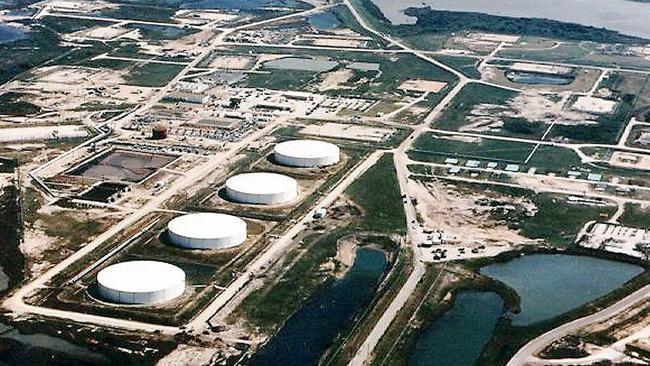
In an effort to boost Australia’s commitment to have more oil on hand, the Government spent $100 million earlier this year buying emergency fuel.
However, the fuel isn’t in Australia, but is stored underground in Texas as part of the US’ Strategic Petroleum Reserve.
The move was questioned by Labor leader Anthony Albanese who said “the US is not New Zealand. It’s not next door” and said more domestic storage was needed.
Mr Taylor said at the time the Texas purchase was a “down payment” and on a “stronger and more secure fuel supply” for Australia.
Industry watchers have said that if Australia does not need the US-stored fuel it could later sell it for a profit.
Originally published as Controversial call to hike petrol prices to secure Australia’s fuel security

